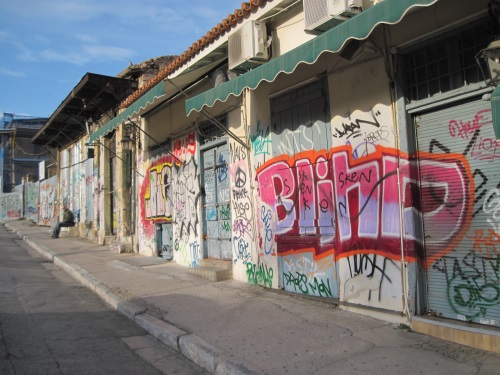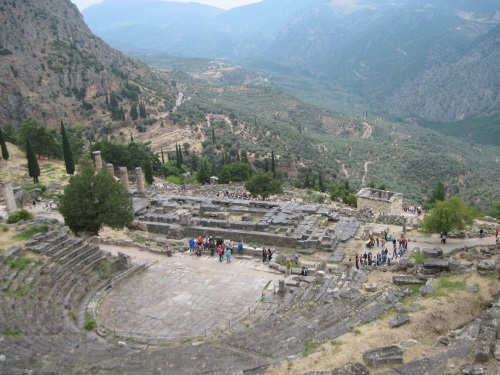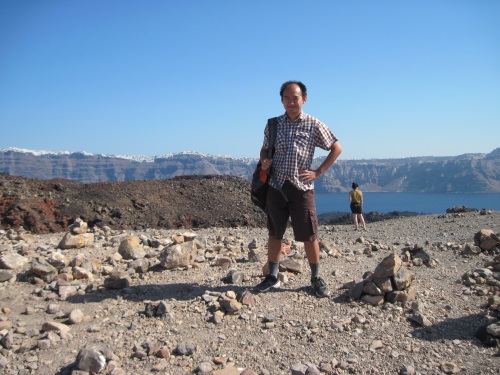
Some notes on my recent trip to Greece. I’m not going to relate complete experiences here. Just observations about the country, in no particular order.
- I’m a regular reader of Tyler Cowen’s Marginal Revolution blog. Not too long ago, he wrote posts describing how Greece is really a third world country that doesn’t belong in the EU. Travelling around Greece, it isn’t difficult to see why this is true. Central Athens for example looks run down, full of graffiti and generally dirty, with large garbage bins right out on the street, homeless people sleeping rough and the stench of urine permeating subway stations. We frequently saw residents rummaging in the rubbish while in Athens. It does not feel like a western European city at all, more like something in Russia.
- Later we visited the port area of Piraeus. That part looks more like a modern city, though there are still graffiti about. One thing you won’t see in Athens at all are skyscrapers. It seems like the tallest buildings are most seven or eight storeys high. Most are lower. If you look out over the city from a high vantage point, the cityline is pretty uniformly level and conforms very well to the natural landscape.
- Out in the countryside, there are large tracts of empty, undeveloped land, presumably either because the land is too mountainous to be used or not fertile enough. I recall Tyler Cowen mentioning that land titles are a big problem in Greece since there is no centralized land ownership registry with unified lot numbers. This is a mainly agricultural country, with a disproportionately large shippping industry and tourism industry and little manufacturing.
- That said, for all the country’s obvious economic difficulties, tourist attractions and facilities are very well maintained. This is a country that takes tourism seriously and they’re clearly aware of their cultural heritage as well. You won’t see graffiti on the historical monuments for example.

- In general, Greece is extremely mountainous. No matter where you go or where you look, you are likely to see mountains. The country is also very dry, so there is little vegetation. You won’t see tall trees anywhere, it’s all stumpy, short trees and scrubland. This gives the mountains a very stark, imposing look. Due to its shape, it has very long coastlines, so everywhere we went on the bus, we would constantly encounter the sea.
- English is surprisingly prevalent and the Greeks are mostly happy to speak it. I asked our tour guide about this and she replied that the Greeks are very much aware that Greek is no longer a dominant language and so will learn any language, including Chinese if they think it will help them. I also said that you won’t see this in other European countries such as France, Italy and Germany, and she said that those countries do think that their languages are dominant. French is also surprisingly common from what I can see. I even saw French language commercials on Greek television channels, with Greek subtitles.
- Everything is in Euros and therefore expensive for Malaysians. But Athens turned out to be surprisingly cheaper than I expected. Santorini was extremely expensive by comparison with prices often being more than double those in Athens.
- The highlight of Athens is of course the Acropolis. Sadly, much of it is in ruins and as we later saw on our trips to the other archaeological sites, the Parthenon actually counts as one of best preserved, most impressive sites. You can’t expect buildings dating back 2,500 to 3,500 years ago to be in good shape. Those who don’t care about the historical significance have to be content with the scenery and those who do will find it hard not to feel some reverence. This is after all the cradle of all Western civilization and the birthplace of democracy.
- Our tour guide on the 4 days 3 nights was incredibly knowledgeable and well-trained. I find it almost unbelievable that all Greek tour guides could be so well-trained. She kept up a constant running commentary detailing the history of each area we visited, told stories of Greek mythology and related random anecdotes about the Greeks and life in Greece. This included all manner of facts such as the reason for schism between Catholicism and the Orthodox church, how olives are harvested and how the Renaissance essentially passed by Greece because it was under the Ottoman Empire at that time. Seriously impressive stuff. She also had absolutely zero tolerance for bullshit and would simply say she didn’t know when confronted with something she didn’t know and was always careful to state when something is pure speculation rather than solidly backed by evidence.

- My favourite archaeology site is probably Delphi, thanks to the perfect combination of impressive ruins with a fantastic backdrop. According to legend, Apollo picked the site personally and it’s hard to imagine a more perfect choice of a location to site an oracle. The nearby town is as quaintly picturesque as any you could imagine while the Amalia Hotel that we stayed in has a unique stone construction and an impressive fireplace in the lobby.
- Epidaurus and Olympia were less impressive, even if Epidaurus has a very cool amphitheatre. They’re pleasant enough in the way that botanical gardens are pleasant to visit, but nothing particularly noteworthy. Maybe if you’re a sports fan, Olympia would have more emotional resonance. For me, it mostly reminded me of how much of a marketing phenomenon the modern Olympics are and how little relationship it shares with the original one.
- By contrast I really liked Meteora, more for the spectacular location than the monasteries. We had some fog on the day we visited so the buildings looked like castles on spires on top of clouds, right out of a fantasy RPG. The whole place also looks down on the plain of Thessaly below and I’d swear that the blocks of farmland look like an isometric view of a strategy game like Civilization. Their air must be incredibly clean to permit such far line of sight.
- One thing about Greece is that all the buildings in an area all tend to share the same look. Our guide commented while in Meteora that there are actually local laws restricting building heights and maybe decoration and style. This was especially obvious in Santorini with the all of the buildings having the same bleached white color with blue trims and rounded roofs. We didn’t visit the other islands and as the ferry stops at each of them, we noted that each island also seemed to have its own distinctive look for its buildings.

- As for Santorini, it’s pretty cool to think that it could be the basis of the legend of Atlantis. We really missed having a guide for the Akrotiri site but it was too expensive for just the two of us. Standing in the middle on the island with the volcano really lets you see just how big that ancient volcanic eruption must have been as you survey all of the surrounding islands. The winds up there are terrifically strong too.
- We found Santorini to be really quiet because it was off season. Apparently the tourism industry on the island completely shuts down from end October to the following April. There weren’t many people on the beaches of Perissa and Pyrgos was completely deserted. Only Fira still had decent numbers of people. You can get better deals and maybe better service in the off season, but it would have been exciting to see all the people around during the summer.
- One common problem in Greece is that places have many names. For example, the capital of Santorini is Fira, but it is also known as Thira. This turns out to be the official version of the name of the entire island itself which classically was known as Thera. It gets worse when you consider that street names have both Greek and English names and maps may use either interchangeably. The Greeks may be able to instantly read the Greek alphabet and understand what is being meant but tourists sure can’t. But at least you can get by with English which you probably can’t in France or Germany.
- There’s seems to be little variety in Greek food. Mostly you see Greek yoghurt, moussaka and souvlaki in restaurants everywhere. They are cool and novel at first, but we were quickly bored during all of the hotel buffets. I think here in Malaysia we are spoiled by the tremendous variety of cuisines we have available, both from Malaysia and all around the world.
- My observation is that the Greeks seem very religious. You see a lot of churches and there seem to be little Christian shrines dedicated to various saints pretty much everywhere. You often see little shrines next to the road. According to our tour guide on the mainland, these are the sites where people have died from a car accident. A quick search on Wikipedia reveals that approximately 80% of Greeks believe that there is a God. The comparable figure for France is around 30%. I can’t quite figure out how their belief in Christianity fits in with the evidence for the past worship of the Greek gods that is lying around everywhere.
So this is all I have to say on Greece. The mainland tour wouldn’t be suitable for children or for adults with no interest in history. Santorini was interesting for us for the hiking and the scenery but I didn’t much care for its reputation as a romantic spot. It was a fun and surprisingly educational trip, thanks mainly to the extremely knowledgeable tour guide on the classical tour. We mostly found the Greeks to be very friendly, patient and welcoming to tourists, which once again, wouldn’t be the case in France.